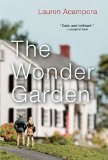Summary | Excerpt | Reviews | Beyond the Book | Readalikes | Genres & Themes | Author Bio

The Umbrella Bird
It had been a touch of incredible fortune to find David
one spring night at a dive on Houston Street. He'd been
attending a coworker's farewell gathering, an anomalous
outing for him. He was short-haired and clean against the peeling
paint and graffiti. That he'd been there that night nursing a
Stella Artois, and had needed the restroom at the same time as
she, had upended statistical logic. He was taller than everyone,
and thinner, as if streamlined for air travel. Not conventionally
handsome, but with a narrow, austere face. His green irises
seemed lit, like dappled leaves on a forest floor. When he looked
at Madeleine, she was briefly paralyzed, a field mouse in a clearing.
He bought her a vodka tonic and left a three-dollar tip
for the bartender. As he handed the glass to her, turning the
tiny straw in her direction, she'd felt the dizzy euphoria of a
traveler who has turned onto the right road, the easy expansion
of lungs as the horizon opens before her.
He was an account supervisor at a big advertising firm in midtown,
he explained breezily, coordinating campaigns for sneakers
and tortilla chips. But later, over a series of ardent dinner dates,
she learned that he'd grown up in the country—on a farm, no
less—and had never felt truly at peace in an apartment building.
Lately he felt that he was being gradually drawn back to Nature,
and now that he'd found her, he suggested with elaborate, softforested
eyes, perhaps his quest was complete. Within six months,
they were married and looking at real estate listings.
The house has been sweepingly renovated, the front door framed
by columns and topped by a counterfeit balcony. It's what the
real estate agent had termed a center-hall colonial, with the kind
of timeless architecture and rigorous symmetry designed to
leverage a calming effect on its inhabitants. Paired with precise,
harmonious details, she implied, a house like this had the power
to transform its owners' experience of the world, to render any
obstacle—any boiler failure or termite siege—surmountable.
Nearly all their money has gone to the down payment, and
with the little that remains, Madeleine is scrambling to furnish.
With a Sharpie, she circles furniture in soft-lit catalogs:
a sectional sofa, a leather armchair, a mirrored console table.
Deliverymen put them in place. Still, the rooms echo.
Alone, she wanders the house on the balls of her feet. It is
preternaturally quiet, the walls themselves thick with insulation,
sealing out the buzz of the world. A sliding glass door displays
a wide lawn tumbling to a thumb-smudge of trees. She has
reached it at last: this asylum, this glorious valve. Madeleine
had first glimpsed this kind of life as a girl, visiting a friend
who'd moved to a verdant nook of New Jersey. Entering that
house had been like entering a palace: the soaring entrance hall,
floors that didn't sag toward the middle, bay windows looking
onto wanton grass and trees, the great yawn of sky. There, she'd
learned to ride a bicycle. Pedaling back and forth on that wide
blacktop driveway, she'd felt the first ecstasy of flight.
She has never lived anywhere but in a gerbil cage. She has
never had money. Her father was a bag-eyed jazz musician—
dead in middle age—her mother a schoolteacher who supported
them all. Madeleine had diligently sidestepped adulthood in
her parents' lopsided brownstone on Charles Street, among
the aging socialists and drag queens. Before meeting David,
she had acquired the habits of every cynical city girl: shutting
down dirty bars, flattering scrawny musicians, waking Sundays
on ripped Naugahyde couches.
Tonight, he is out in the woods, building a tree house for
their daughter who is due in a month. Although she will not
use it for years, he has thrown himself into the project as if on
a deadline. Each evening, when he comes home from work, he
puts on old jeans, disappears into the garage, and cuts lumber
with a power saw. Madeleine has agreed not to visit the tree
house until it is finished. She watches David carry wooden
planks over the grass to the woods, the late-summer sun casting
his long shadow before him. His hands have become splintered
and raw, his forearms welted from the ash tree he has selected.
Excerpted from The Wonder Garden by Lauren Acampora. Copyright © 2015 by Lauren Acampora. Excerpted by permission of Grove Press. All rights reserved. No part of this excerpt may be reproduced or reprinted without permission in writing from the publisher.
Your guide toexceptional books
BookBrowse seeks out and recommends the best in contemporary fiction and nonfiction—books that not only engage and entertain but also deepen our understanding of ourselves and the world around us.